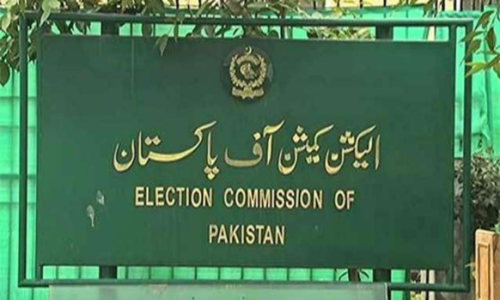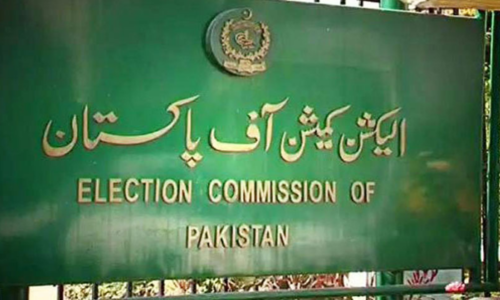Information Minister Fawad Chaudhry on Sunday said that the 2023 general election would be based on and possible only after electoral reforms, adding that "there is no other way [possible] except this."
Addressing a press conference in Islamabad along with Science and Technology Minister Shibli Faraz, he said the government wanted to take the opposition into confidence regarding electoral reforms. "We think those elections will be better in which the government and the opposition are on the same platform," Chaudhry said.
However, he said, if the opposition refused to move beyond the cases against it then "we will be forced".
"We can't leave everything and go for the 2028 [general election]. The 2023 general elections will be based on and only possible after reforms — there is no other way [possible] except this," the information minister said.
Faraz too echoed his colleague, saying, "our leader's commitment tells that 2023 elections [will happen based on reforms] whether anyone likes it or not."
He said the opposition had opposed electronic voting machines (EVMs) without "bothering to understand them" despite Prime Minister Imran Khan's offer to sit together on electoral reforms and the government's offers to come and inspect EVMs for themselves.
The information minister added that the opposition leaders were "only interested in their cases" and brought the matter up whenever the government raised any issue with them. He said they had to face their cases themselves and it was a matter between them and the courts.
"We can not hold their hands. [Regarding electoral] reforms, the serious people among them should step forward and make their leadership realise that reforms are necessary for the next elections."
Criticism of ECP report on EVMs
Chaudhry also criticised the Election Commission of Pakistan's (ECP) report on EVMs that was submitted to the Senate Standing Committee on Parliamentary Affairs and had 37 objections.
He claimed that in the ECP's report, "the data in favour of EVMs vanished and it was taken out. Such objections were made which show that they had already decided to submit a report against EVMs".
The information minister said the removed data included information from other countries and their positive experiences with EVMs such as the Philippines, Estonia and the Dominican Republic.
He also said pilot projects had been conducted in Chakwal and Peshawar "whose testimonials are in front of you and all people said the elections were very fair".
Regarding the 37 objections raised by the ECP, Chaudhry said only 10 were related to EVMs.
"The problem is that the chief election commissioner (CEC) appears to be speaking the language of the opposition [...] this does not happen. Every institution has a character [...] the way a movement is being run to discredit EVMs and the way positive material was excluded, it clearly shows the CEC is opposed for some reason to the reforms that the government wants to bring.
"No one [has trust] on the ECP. All of the elections that the CEC carried out have been controversial," the information minister claimed. He called upon other ECP members to step forward and review the CEC's decisions.
Chaudhry said the CEC should distance himself from "conflicts" since "the activities he is currently doing are in unbecoming of his position".
Adding to the information minister's criticism, Faraz said when the 37 objections were analysed, "it was clear that 27 points were a charge-sheet against the ECP itself and highlighted its incapacity. The 10 points on the technical side relating to EVMs had no link to the machine because they did not even bother to look at the machine and see whether the present prototype resolves the points they are mentioning."
Challenging the objections, the science and technology minister said the prototype had 100 per cent ballot secrecy, guaranteed voter anonymity and complete transparency, among other security features.
He emphasised that the government's purpose was not to use that specific machine and that the ECP could choose to use it or not. The broader concept, Faraz said, was the use of technology to resolve problems of political crises as had been witnessed in previous elections.
Faraz alleged that the ECP was not interested or had the intention to carry out electoral reforms which was "very concerning". He said the ECP would have to show its seriousness in working, increasing its capacity and playing its part in technological incorporation.
'Exhibiting restraint'
The information minister said the Supreme Court's order to use technology in the Senate Elections had been violated by not using it and the government could pursue a contempt case against the CEC but "we are exhibiting great restraint whereas the ECP sent a notice" — apparently referring to the notices sent to him and Railways Minister Azam Swati by the ECP over their comments about the institution.
"The CEC will have to seriously reflect on his behaviour. We are exhibiting restraint till now. The federal cabinet has till now tolerated the election commissioner with bravery and we have not taken action on the personal attacks that have been made," he said.

















































